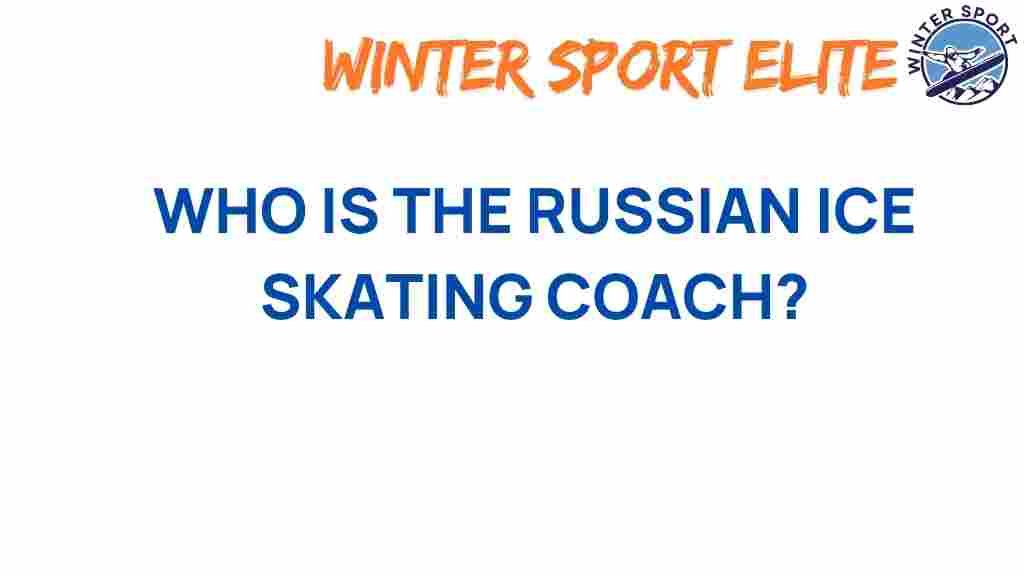Unveiling the Enigmatic Russian Ice Skating Coach: Who Is She?
When it comes to the world of figure skating, few nations have left as profound an impact as Russia. The Russian ice skating coach has become a pivotal figure in shaping the careers of countless athletes, guiding them to national and Olympic glory. In this article, we will delve into the life and influence of these enigmatic coaches, exploring their training methods, mentorship styles, and the secrets behind their athletes’ stellar performances.
The Legacy of Russian Ice Skating Coaches
Russian ice skating coaches have a rich history that dates back decades. Their training philosophies and techniques are often regarded as some of the most effective in the world. These coaches are known for their rigorous training regimens and an unwavering commitment to excellence.
- Historical Significance: The Soviet Union produced a plethora of world-class figure skaters, many of whom were molded by exceptional coaches.
- Innovative Techniques: Russian coaches are known for integrating ballet, gymnastics, and other disciplines into their training, creating well-rounded athletes.
- Mental Toughness: Emphasis on mental preparation is a key component of training, helping athletes cope with the pressures of competition.
Who Are These Coaches?
The identity of a Russian ice skating coach often remains shrouded in mystery. Many of them have extensive backgrounds in competitive skating themselves, having competed at high levels before transitioning to coaching. Their experiences enable them to relate to their athletes, instilling a sense of trust and motivation.
Some renowned Russian ice skating coaches include:
- Tatiana Tarasova: A legendary coach with a remarkable track record of developing Olympic champions.
- Alexei Mishin: Known for his innovative choreography and emphasis on artistry in performance.
- Ekaterina Gordeeva: A former figure skating champion who now imparts her wisdom to the next generation of skaters.
Understanding the Training Process
The training process for figure skaters under a Russian ice skating coach is intensive and multifaceted. Here’s a step-by-step breakdown of how these coaches typically approach training:
Step 1: Assessment of Skills
Initially, a thorough assessment of the athlete’s current skills and potential is conducted. This helps the coach tailor a training plan that addresses individual strengths and weaknesses.
Step 2: Developing a Training Plan
After the assessment, the coach collaborates with the athlete to create a comprehensive training plan. This plan includes:
- On-ice training sessions focusing on technical skills.
- Off-ice training for strength and flexibility.
- Choreography sessions to enhance performance artistry.
Step 3: Mental Coaching and Visualization
Mental preparation is crucial in figure skating. Coaches often incorporate techniques such as visualization and mindfulness to help athletes build confidence and manage performance anxiety.
Step 4: Regular Competitions
Competing regularly is essential for athletes to gain experience and test their skills. Coaches guide their athletes through the competitive season, providing support and adjustments as needed.
Step 5: Feedback and Adaptation
Post-performance analysis is vital. Coaches provide constructive feedback, helping athletes understand areas for improvement and celebrate their successes.
Challenges Faced by Athletes
While the journey to becoming a successful figure skater is rewarding, it is fraught with challenges. Some common issues athletes face include:
- Injury: The physically demanding nature of figure skating can lead to injuries that require careful management.
- Pressure to Perform: With high expectations, athletes often feel immense pressure during competitions.
- Balancing Academics and Training: Young athletes must find a way to balance school commitments with rigorous training schedules.
Mentorship: The Heart of Coaching
One of the most significant roles of a Russian ice skating coach is that of a mentor. Beyond just teaching techniques, these coaches build strong relationships with their athletes, fostering an environment of trust and support.
Key aspects of mentorship in coaching include:
- Emotional Support: Coaches are there to provide encouragement during tough times, helping athletes navigate the ups and downs of their careers.
- Life Skills: Coaches instill valuable life lessons, such as discipline, resilience, and teamwork, which benefit athletes beyond skating.
- Personalized Guidance: Each athlete is unique, and effective coaches adapt their mentorship style to meet individual needs.
How to Choose the Right Coach
Finding the right Russian ice skating coach can significantly impact an athlete’s career. Here are some tips for selecting a coach:
- Research Credentials: Look for coaches with a proven track record in developing successful athletes.
- Evaluate Coaching Style: Consider what coaching style resonates with you—some athletes thrive under strict regimes, while others prefer a more relaxed approach.
- Meet and Observe: If possible, meet with the coach before committing. Observe how they interact with their students and their training methods.
Incorporating Modern Techniques
While traditional methods are integral, many Russian ice skating coaches are also embracing modern technology to enhance training. This includes:
- Video Analysis: Utilizing video footage to analyze performances and identify areas for improvement.
- Data Tracking: Monitoring athletes’ physical metrics to tailor training loads effectively.
- Online Resources: Providing access to online training materials and resources for athletes to study at home.
Conclusion: The Enduring Influence of Russian Ice Skating Coaches
The role of a Russian ice skating coach in shaping the future of figure skating cannot be overstated. Through their rigorous training, unwavering mentorship, and innovative techniques, these coaches continue to produce world-class athletes who compete at the highest levels, including the Olympics.
As the figure skating landscape evolves, the fundamental principles instilled by these coaches remain timeless. Their dedication to the sport and their athletes ensures that the legacy of Russian ice skating coaching will endure for generations to come.
For more insights into figure skating coaching and training techniques, you can check out this resource. To learn more about the history of Russian figure skating, visit this link.
This article is in the category Training and created by WinterSportElite Team
